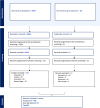The benefits for health care staff of involvement in applied health research: a scoping review
- PMID: 40826082
- PMCID: PMC12359832
- DOI: 10.1186/s12961-025-01365-1
The benefits for health care staff of involvement in applied health research: a scoping review
Abstract
Background: Initiatives are increasingly encouraging health and social care staff involvement in research, with evidence for patient and organisational level benefits. There is less evidence of the benefits for staff and whether this varies by type of involvement. This scoping review aimed to identify the different ways staff are involved in applied health research, the benefits experienced, and whether this varies by type of involvement. This will help to inform leaders in service organisations, funders, and researchers about how to maximise such benefits.
Methods: The scoping review followed the JBI methodology. Four databases were searched: CINAHL, MEDLINE, PsycINFO and Scopus. Grey literature was identified via Google, Google Scholar and relevant websites. Records had to be UK-based, published in English between 2003 and 2023 and cover applied health and care research, health care staff involvement and report on benefits. Text was extracted from records, coded afterwards, and quality checked. The benefits were distilled by four research active health care staff. Descriptive statistics and narrative synthesis were used to report the results.
Findings: In total, 49 records were reviewed, 42 records were from the database search and 7 from the grey literature search. Records were most commonly journal articles (n = 44), covering multiple care settings (n = 15) and mixed professional groups (n = 24), used qualitative methods (n = 22) and focussed on clinical academic roles (n = 21). Six benefits of involvement in research were distilled: personal fulfilment, general competencies/skills, connections/networks, opportunities for learning, opportunities for leading improvements in practice, and using evidence more effectively. Records that focussed on the more intensive clinical academic roles reported more examples of opportunities for leading improvements in practice, and the building of connections and social support. Non-clinical academic records more frequently reported that involvement in research provided opportunities for learning.
Conclusions: These findings support efforts to involve staff in research, with a range of benefits associated with enhanced job satisfaction, even when research involvement is in a less intense form, such as participation in a study. These findings can be used to encourage involvement, with recommendations for future research to review the benefits for social care staff, and to examine more directly the effect on staff wellbeing and retention.
Keywords: Benefits; Health care staff; Research involvement.
© 2025. The Author(s).
Conflict of interest statement
Declarations. Ethics approval and consent to participate: Not applicable (review). Consent to participate: Not applicable (review). Competing interests: The authors declare no competing interests.
Similar articles
-
Health professionals' experience of teamwork education in acute hospital settings: a systematic review of qualitative literature.JBI Database System Rev Implement Rep. 2016 Apr;14(4):96-137. doi: 10.11124/JBISRIR-2016-1843. JBI Database System Rev Implement Rep. 2016. PMID: 27532314
-
Prescription of Controlled Substances: Benefits and Risks.2025 Jul 6. In: StatPearls [Internet]. Treasure Island (FL): StatPearls Publishing; 2025 Jan–. 2025 Jul 6. In: StatPearls [Internet]. Treasure Island (FL): StatPearls Publishing; 2025 Jan–. PMID: 30726003 Free Books & Documents.
-
Factors that influence participation in physical activity for people with bipolar disorder: a synthesis of qualitative evidence.Cochrane Database Syst Rev. 2024 Jun 4;6(6):CD013557. doi: 10.1002/14651858.CD013557.pub2. Cochrane Database Syst Rev. 2024. PMID: 38837220 Free PMC article. Review.
-
Participation in environmental enhancement and conservation activities for health and well-being in adults: a review of quantitative and qualitative evidence.Cochrane Database Syst Rev. 2016 May 21;2016(5):CD010351. doi: 10.1002/14651858.CD010351.pub2. Cochrane Database Syst Rev. 2016. PMID: 27207731 Free PMC article.
-
Eliciting adverse effects data from participants in clinical trials.Cochrane Database Syst Rev. 2018 Jan 16;1(1):MR000039. doi: 10.1002/14651858.MR000039.pub2. Cochrane Database Syst Rev. 2018. PMID: 29372930 Free PMC article.
References
-
- Bell C, Colleran V. Empowering nurses, midwives, and allied health professionals to gain an academic, research and quality improvement experience within clinical practice. Int J Pract Based Learn Health Soc care. 2019;7(2):69–79.
-
- Boase S, Kim Y, Craven A, Cohn S. Involving practice nurses in primary care research: the experience of multiple and competing demands. J Adv Nurs. 2012;68:590–9. - PubMed
Publication types
Grants and funding
- NIHR 200166/National Institute for Health Research Collaboration for Leadership in Applied Health Research and Care Yorkshire and Humber
- NIHR 200166/National Institute for Health Research Collaboration for Leadership in Applied Health Research and Care Yorkshire and Humber
- NIHR 200166/National Institute for Health Research Collaboration for Leadership in Applied Health Research and Care Yorkshire and Humber
- NIHR 200166/National Institute for Health Research Collaboration for Leadership in Applied Health Research and Care Yorkshire and Humber
- NIHR 200166/National Institute for Health Research Collaboration for Leadership in Applied Health Research and Care Yorkshire and Humber
- NIHR 200166/National Institute for Health Research Collaboration for Leadership in Applied Health Research and Care Yorkshire and Humber
- NIHR 200166/National Institute for Health Research Collaboration for Leadership in Applied Health Research and Care Yorkshire and Humber
- NIHR 200166/National Institute for Health Research Collaboration for Leadership in Applied Health Research and Care Yorkshire and Humber
- NIHR 200166/National Institute for Health Research Collaboration for Leadership in Applied Health Research and Care Yorkshire and Humber
LinkOut - more resources
Full Text Sources


